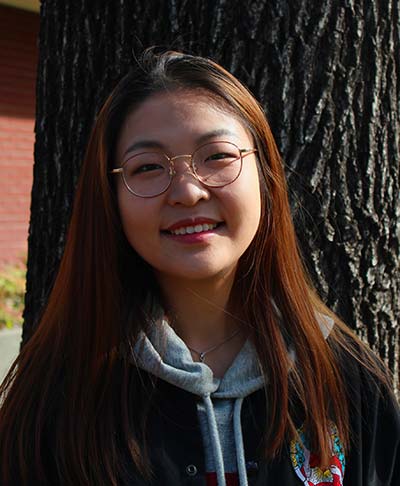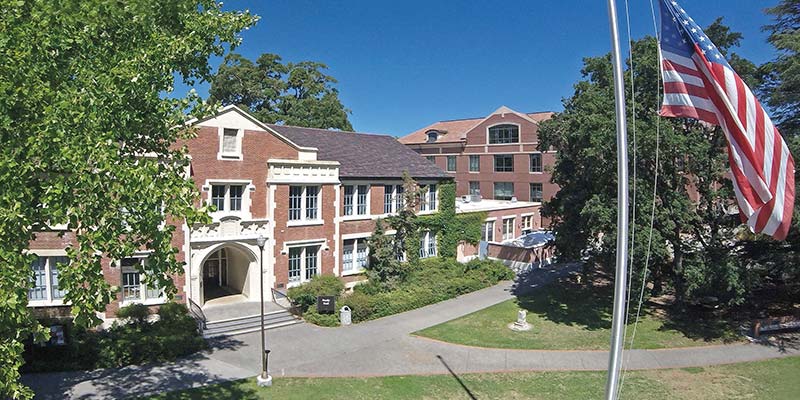
Why did you decide to study in the USA?
My parents and I all agree that studying in the U.S. will benefit my personal and academic growth. Being immersed in a multicultural environment and an entirely different education system from China would broaden my perspective and enhance my creativity. Moreover, studying abroad in a foreign country would not only force me to be independent in my studies, but in my personal life as well.
Why did you choose Santa Rosa Junior College?
I heard about Santa Rosa Junior College (SRJC) through former high school classmates. I went to a high school in Northern California, and several of my old classmates went to SRJC after high school. From SRJC, they successfully transferred to a good four-year college. While they were studying at SRJC, I came to visit them. I loved the campus and its study atmosphere immediately. Santa Rosa Junior College is a beautiful campus, conveniently located near the downtown. What I like most about SRJC is its library, which has four floors and several study environments to choose from. On the first floor there is a tutoring center where everyone can get individualized help on all kinds of subjects at no cost. One of the most interesting courses at our school is Tai Chi, and the instructor was trained at Shaolin Temple in China!
What do you like best?
What I like most about our international student program is that it really connects students with each other. When we first arrived to school, before classes began, the international office held a student orientation, where not only did they provide us with information on academic programs, campus resources, and local living facilities, but they also arranged games and events in order for us new international students to meet each other and our senior colleagues from whom we could gain help and advice
What do you miss most?
The thing I miss most about home is the Spring Festival, aka Chinese New Year. Prior to coming to Santa Rosa Junior College, I was a student at an American high school. During my time at the high school, I would never be able to celebrate Spring Festival, because it was at the beginning of the spring semester and I would be studying and doing homework. However, when I came to SRJC, I celebrated Chinese New Year with people from all around the world during the SRJC International Club celebration. Local Chinese dance performers came to campus to perform, and the SRJC International club sold Chinese treats and held activities like writing your name in Chinese calligraphy.
How did you choose your university or intensive English program?
At first, my parents wanted me to go straight to a four-year college, because in their mind, that is what a “normal” study path should be, and because they were afraid that coming to a community college would limit my development. I convinced them that studying at a community college would save time and money, and if I am willing to learn, any place would be the right place to study. I chose my college based on three main reasons. First, I knew many former students attending Santa Rosa Junior College who successfully transferred to great universities, and I saw statistics of the transfer rate to UC and CSU schools were very high, so I was sure that SRJC is great for preparing to transfer to a four year college. Second, I visited the campus and the city, and I loved the comfortable environment of the campus and community and the college’s excellent academic facilities. I like how Santa Rosa is a small town but with beautiful sites and friendly people, and it is very close to San Francisco. Last but not least, our school provides ESL courses on campus, so English-learning international students are also tied strongly with all the local students, and they can take some interesting courses along with ESL.
What was your biggest surprise?
The biggest surprise about U.S. life and education is how studying at Santa Rosa Junior College has helped me build my confidence. It is very easy to make new friends in classes; my classmates want to get to know me, and I can get to know them, with all their various backgrounds and interesting experiences. Faculty care about everyone’s opinion. They encourage everyone’s opinion in discussions, and everyone’s voice is important. Moreover, outside of the classroom, there are all kinds of different student-organized clubs that I participate in. It is a great experience for me to join these interesting groups and take on leadership roles.
... your biggest disappointment?
The biggest disappointment I have about studying in the U.S. is that the textbooks, especially those for science and languages, are extremely expensive. Used textbooks are cheaper, but they are also very popular at the campus bookstore and sell out quickly. However, I can always buy or rent textbooks online, or borrow them from the library or from friends. And the campus bookstore buys back some popular textbooks from students at the end of the semester, so overall it is actually not that bad.
How have you handled:
... language differences?
I have been studying English since third grade, but when I first came to the U.S. it was still very difficult for me to handle the language difference. The quickest way to adapt to the language difference is to talk without a fear. I was very nervous whenever I spoke in English, because I was always afraid that if I made mistakes, people would laugh at me or judge me. However, later I found out that people are all very understandable; they know that as a foreigner I am still learning English, and the fact that I can speak another language is impressive. Therefore, I started to talk “shamelessly”: even if I make mistakes in pronunciation or grammar, I won’t appear uncomfortable or ashamed anymore. Instead I will ask for correction from the people I talk to, and they are always willing to help me. Moreover, a lot of the people who help me with English are also very interested in my native language, and I enjoy teaching them some simple phrases in Mandarin.
... finances?
Due to the exchange rate of RMB and USD, it is a lot more expensive to live in the U.S. Even though my parents did not ask me to help them pay for my college education, I really wanted to share their financial burden of supporting me studying abroad. So I found myself an on-campus job at our campus museum. I love our museum, and I am happy that I get to work there. By working at the campus museum, I am able to earn some money and gain different experiences. Moreover, sharing an apartment with others and cooking for ourselves are also great ways to save money.
.. adjusting to a different educational system?
The educational system is totally different here in the U.S. It was very hard for me to adjust to it at first. I found it very hard to be active during class; I was always afraid to speak up for myself, so it was easy for other people to misinterpret me as nerdy or not gregarious. However, as I adjusted my attitude towards making linguistic mistakes, the situation turned out a lot better. Moreover, in the U.S. education system, it is very important for students to take control for their own academic progress, so forming a study group with classmates or setting your own study pace is very important. Even though the faculty are all extremely nice and Santa Rosa Junior College offers a lot of resources, I have to approach them first. It is very important to communicate with instructors whenever you encounter difficulties in studying; you have to let them know what your problems are, so they can provide advice or adjustments for you. If you never go to the instructors, they would automatically assume that you do not care about your own studies.
What are your activities?
In my first year of college, I volunteered at the local Tzu Chi organization, where I made and distributed Chinese food to the homeless people in the homeless shelter and on the road. I also volunteered at the school museum for one semester, and the next semester they hired me as a student employee. As a museum employee I arranged the database and designed exhibits of different themes. Additionally, I became the president of the SRJC International Club last semester. As club president, I help international students get to know each other, blend into the local community better, and to experience different cultures.
How easy or difficult was making friends?
I would say it is fairly easy to make friends in the USA. When I first came here, I quickly made friends who were from Asian countries just like I am. It was very easy for us to form small groups to support each other as we have similar experiences and face similar challenges studying abroad. However, it is also very important to not let small groups of similar friends limit you. If you can walk out of your comfort zone and take a step forward to start a conversation with someone, making friends will be very easy. A lot of local students are very interested in different cultures, and they are willing to know you and your stories better. Sharing stories is the fastest way to make new friends. My first best friend at Santa Rosa Junior College was a Mexican girl. She helped improve my Spanish abilities, and we have made the plan of her visiting me in China over the summer. Our relationship started on the first day of school, where I did not know where the library printing room was, and she showed me the way and helped me print my documents.
How relevant is your U.S. education to your personal goals and to the needs of your country?
For my job at the campus museum, I was responsible for maintaining the cultural relics database. This experience has inspired me to major in mathematics and computer science and minor in art, so that I may one day manage a museum and help protect cultural relics. The American education that I am receiving at Santa Rosa Junior College has provided me a chance to explore all kinds of different courses so that I could be sure of what my true interests are. The freedom in the U.S. education system has helped me to develop creatively and to take responsibility for myself. This will be extremely helpful in my future educational pathways and in my future career planning.
What is your advice to other students who are considering a U.S. education?
I would say to be fearless is the key of pursuing a U.S. education. You have to be willing to face new challenges and try new things, because only when you give something a try can you find out how awesome it can turn out. This will also help you stay enthusiastic about studying and life, and it will help you better adapt to your new environment. However, you have to know clearly what the boundary is: there is always something that you can never give it a try, for example drugs. It is always good to have a plan when you do anything, so you have a goal to look to in your pursuit of education here in the U.S. Moreover, it is always important to keep in contact with your parents, because even though you are now in a brand new environment with many exciting new things happening, your parents are always worried about you and they want to know what you are experiencing right now.

























